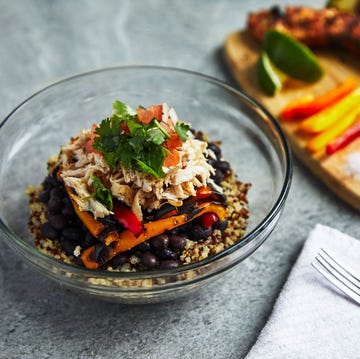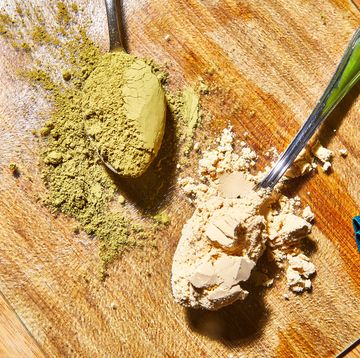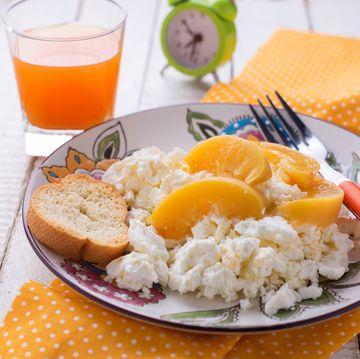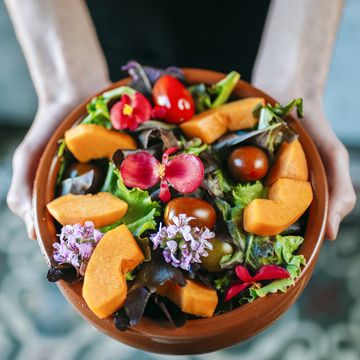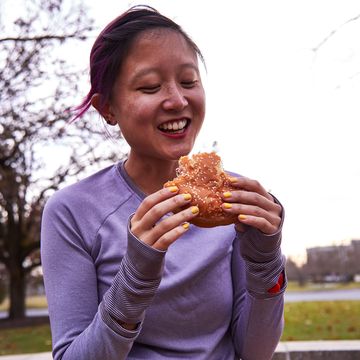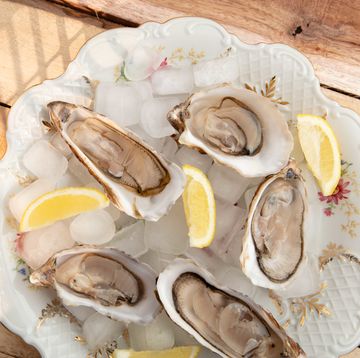Brussels sprouts aren’t always the most popular green vegetable—but they definitely deserve more attention. While you might find them atop an artisanal pizza or roasted in a quinoa bowl, there are plenty of health-promoting reasons to add Brussel sprouts to your grocery list.
Brussels sprouts get their name from Brussels, Belgium where they were first cultivated. And they fall into the cruciferous vegetable category, alongside kale, broccoli, and cabbage, all of which come packed with nutrition. In fact, a study published in 2014 in the Journal of the Academy of Nutrition and Dietetics found that those who consumed more cruciferous vegetables, like Brussels sprouts, had lower levels of inflammation.
Here, even more benefits of Brussel sprouts and exactly how to cook them up.
More From Runner's World

The Benefits of Brussels Sprouts
1. They’re high in vitamin C
Brussels sprouts offer a rich supply of vitamin C, an important nutrient for runners as it works as a powerful antioxidant, supporting recovery after an intense training session, says Yasi Ansari, MS, RDN, CSSD, national media spokesperson for the Academy of Nutrition and Dietetics.
Just one cup of Brussels sprouts provides you with 75 milligrams of vitamin C, which is about 83 percent of the daily value for adults and children 4 and older, Ansari says.
What’s more, vitamin C-rich foods, like Brussels sprouts, also promote iron absorption. “Endurance athletes, especially long-distance runners tend to be at higher-risk of iron deficiency,” Ansari says, which is why it’s even more important for runners to consume vitamin C-dense foods.
2. You get plenty of vitamin K
Another benefit of Brussels sprouts is their ample supply of vitamin K. One cup of Brussels sprouts offers 156 µg of vitamin K, which is over 100 percent of the daily value for adults and children.
Consuming enough vitamin K from foods, like Brussels sprouts, is associated with good bone health, as there are vitamin K-dependent proteins that play a role in the formation and metabolism of bone, Ansari says.
3. They offer a good supply of fiber
Getting enough fiber is essential for health, as this nutrient helps your body regulate digestion. One cup of Brussels sprouts offers just over 3 grams of fiber.
Runners especially need fiber to support healthy digestion, allowing for bowel regularity, and because it can keep athletes more satisfied at meals, as well as maintain energy levels between meals and snacks.
One caveat to keep in mind: Allow three to four hours before training after eating high-fiber foods to allow for digestion, Ansari adds.
4. They pack in potassium
Potassium doesn’t just come from potatoes, Brussels sprouts are also a rich source. Runners need this mineral as its an electrolyte, important for performance during a workout, Ansari says. She adds that potassium plays a variety of roles in our body, working with sodium to help regulate fluid balance.
5 Ways to Prepare Brussel Sprouts
Runner’s World tapped popular chef and author of 20 books, Mark Bittman, to share his favorite ways to cook this little green goddess. “We’ve gone from turning them into gray mush to treating them well—slicing, browning, and cooking them perfectly,” says Bittman.
1. Slaw With Peanuts
Makes 8 servings
Ingredients
- ½ cup mayonnaise
- ¼ fresh lime juice
- 2 Tbsp fish sauce
- 2 tsp sugar
- 1 ½ lb shredded sprouts
- ½ cup sliced scallions
- ½ cup chopped, roasted peanuts
- ¼ cup chopped fresh cilantro
Instructions
Whisk together ½ cup mayonnaise, ¼ cup fresh lime juice, 1 to 2 Tbsp. fish sauce, and 2 tsp. sugar. Toss with 1 ½ lb. shredded sprouts, ½ cup sliced scallions, ½ cup chopped, roasted peanuts, and ¼ cup chopped fresh cilantro. Garnish with more scallions.
Nutrition Information (per serving)
193 calories, 5 g protein, 12 g carb, 4 g fiber, 4 g sugar, 15 g fat, 2.5 g saturated fat, 288 mg sodium
2. Sprouts With Garlic and Walnuts
Makes 4 servings
Ingredients
- ¼ cup olive oil
- 1 lb. trimmed and halved sprouts
- 5 peeled garlic cloves
- Salt
- Pepper
- 1 Tbsp. balsamic vinegar
- ½ toasted and chopped walnuts
Instructions
Heat oven to 400°F. Heat ¼ cup olive oil in pan over medium-high heat until it shimmers. Layer 1 lb. trimmed and halved sprouts, cut-side down, in pan. Add 5 peeled garlic cloves, and sprinkle with salt and pepper. Cook until sprouts begin to brown on bottom, about 7 minutes. Roast in oven, shaking pan every 5 minutes, until sprouts are browned and tender, about 10 minutes. Season to taste with more salt and pepper. Stir in 1 Tbsp. balsamic vinegar, top with ½ cup toasted and chopped walnuts, and serve hot or warm.
Nutrition Information (per serving)
280 cals, 6 g protein, 14 g carb, 5 g fiber, 4 g sugar, 24 g fat, 3 g saturated fat, 103 mg sodium
3. Sprouts and Sage
Makes 6-8 servings
Ingredients
- 4 Tbsp. butter
- 1 lb. cored, diced apples
- 1 lb. trimmed and quartered sprouts
- 1 Tbsp. chopped fresh sage
- Salt
- Pepper
- Parmesan cheese
Instructions
Melt 4 Tbsp. butter in saucepan over medium heat. When melted, add 1 lb. cored, diced apples and 1 lb. trimmed and quartered sprouts. Stir, cover, and cook on low until apples are tender, 10 minutes. Uncover and add 1 Tbsp. chopped fresh sage. Cook on high, stirring, until sprouts darken, another 10 minutes. Season to taste with salt and pepper. Garnish with Parmesan.
Nutrition Information (per serving)
137 calories, 3 g protein, 17 g carbs, 4 g fiber, 9 g sugar, 8 g fat, 5 g saturated fat, 67 mg sodium
4. Braised and Glazed Brussels Sprouts
Makes 4 servings
Ingredients
- 3 Tbsp. unsalted butter or extra virgin olive oil
- 1 lb. Brussels sprouts, trimmed
- ½ cup or more stock, white wine, or water
- Kosher salt and freshly ground black pepper, to taste
Instructions
Combine the butter, Brussels sprouts, and stock in a deep skillet with a tight-fitting lid, sprinkle with salt and pepper, and bring to a boil. Cover and adjust the heat so the mixture simmers; cook until the sprouts are just tender, 5 to 10 minutes, checking once or twice and adding liquid as needed.
Uncover and raise the heat to boil off all the liquid so that the vegetables become glazed and eventually browned, about 3 minutes. Resist the urge to stir them frequently; just let them sizzle until golden and crisp, then shake the pan and loosen them to roll them over. It’s okay if some sides are more well done than others. Taste and adjust the seasoning and serve hot or at room temperature.
Nutrition Information (per serving)
124 calories, 4 g protein, 10 g carbs, 4 g fiber, 2 g sugar, 9 g fat, 5.5 g saturated fat, 136 mg sodium
5. Brussels Sprouts With Bacon and Figs
Makes 4 servings
Ingredients
- 2 Tbsp. olive oil
- 3 slices bacon, chopped
- 1 lb. Brussels sprouts, stems trimmed
- 1 cup dried figs, stemmed and quartered
- Kosher salt and freshly ground black pepper, to taste
- 2 tsp. balsamic vinegar, or more to taste
Instructions
Put a large skillet over medium heat and add oil, then bacon. Cook, stirring occasionally, until it starts to crisp, 5 to 8 minutes.
Meanwhile, put sprouts through feed tube of a food processor fitted with a slicing attachment and shred. (You can also do this with a sharp knife.)
Add sprouts, figs, and ¼ cup water to pan; sprinkle with salt and pepper, turn heat to medium, and cook, undisturbed, until sprouts and figs are nearly tender, 5 to 10 minutes. Turn heat to medium-high and cook, stirring occasionally, until any remaining water evaporates, another 5 to 10 minutes. Add vinegar, season to taste, and serve.
Nutrition Information (per serving)
146 calories, 4 g protein, 17 g carb, 4 g fiber, 10 g sugar, 8 g fat, 2 g saturated fat, 123 mg sodium
Jennifer Acker joined the editorial staff of Runner's World and Bicycling in January 2022. A former freelancer writer and NCAA runner, she started running as a kid and basically never stopped. She also loves outdoor adventures, like hiking, skiing, and mountain biking.


